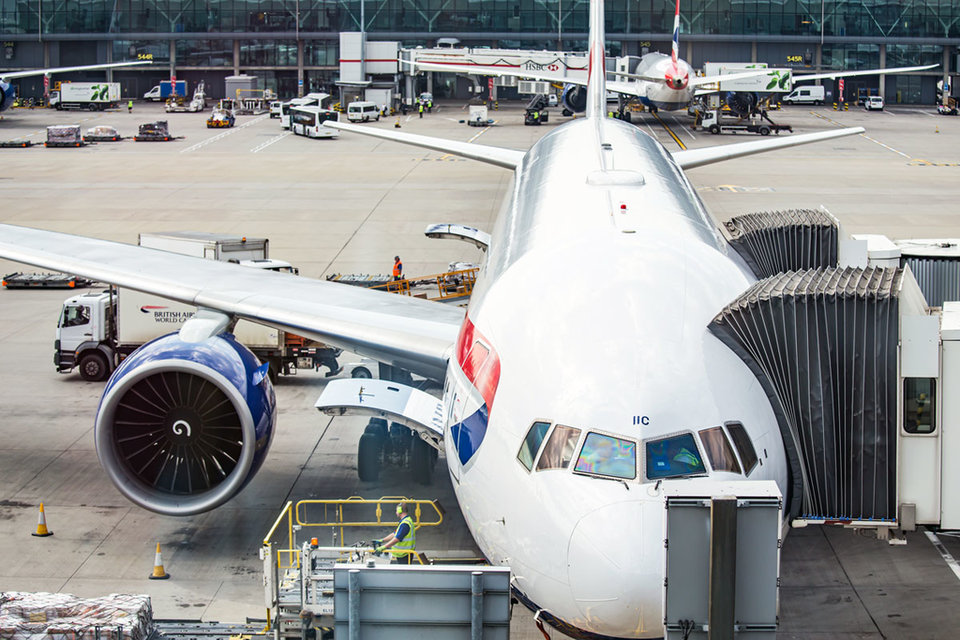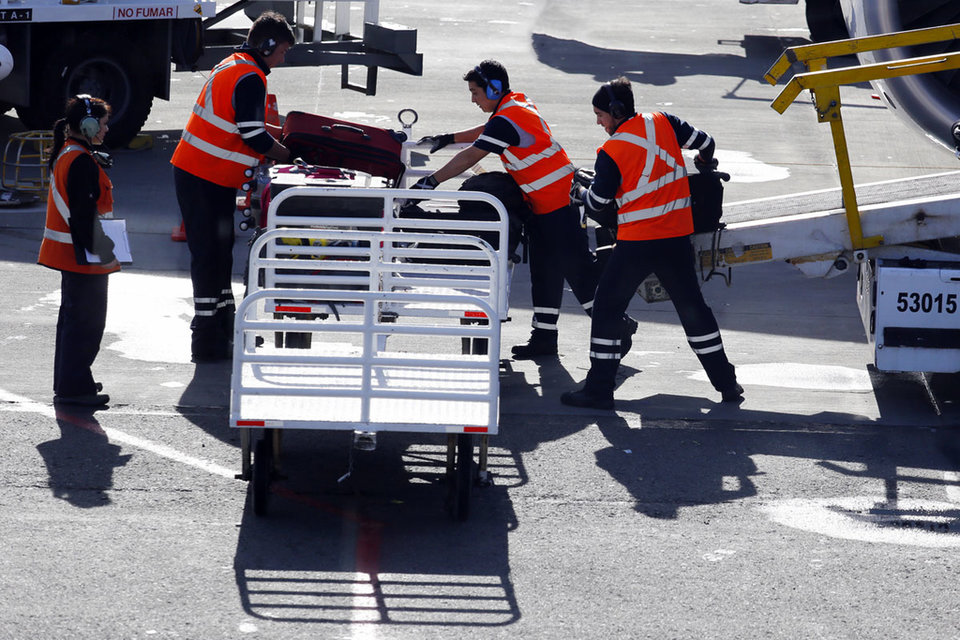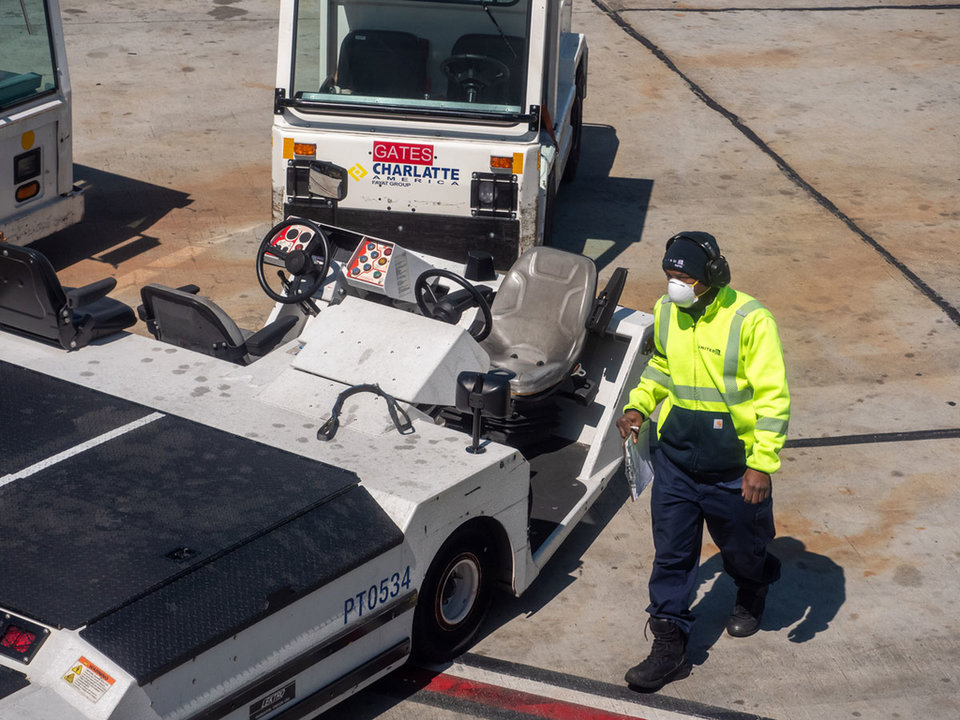Baggage
Airport baggage handler strikes:
is there a crisis in the UK?
With baggage handler disputes recorded at Gatwick, Luton and Stansted airports last year, British hubs are increasingly winding up in the news for the wrong reasons. Adele Berti asks: what are the factors underpinning these clashes, and what do they reveal about working conditions at UK airports?
“The issue is that baggage handlers are undervalued, they're considered as unskilled – even though an airport couldn't function without them – and they're just left to it, struggling to get by at the end of the month and feed their families while their companies are not paying attention and don't consider them as important.”
Talking to AIR magazine earlier in February, Clare Keogh, regional manager at workers union Unite, was hoping Heathrow would soon give in to baggage handler demands as they returned to work after another wave of strikes.
Strikes by baggage handlers have been almost constant in the UK and Europe’s busiest airports for the best part of last year. According to an update from Keogh in April, strikes took place at Heathrow during the first three months of 2020, but are currently suspended due to the ongoing coronavirus pandemic. They have been caused by a long-standing dispute between luggage handlers and their employer Global Baggage Solutions (GBS) over wages. Meanwhile, similar disputes are taking place with another company employing staff at Heathrow, ground handling firm Vanderlande.
Meanwhile, similar disputes are taking place with ground handling firm Vanderlande, another company employing staff at Heathrow.
With tensions already high, let alone the ongoing coronavirus outbreak spurring a new wave of uncertainty and job losses across the aviation sector, what are the key causes of baggage handlers’ discontent?
Image:
Asking to be paid the London Living Wage
In November 2018, Heathrow Airport announced that all its employees should be paid the London Living Wage (LLW) and would be exempted from zero hours’ contracts by the end of 2020. Currently set at £10.55 per hour, the LLW is over £1 higher than its national counterpart due to the growing costs of living in London.
This doesn’t only apply to workers directly employed by the airport.
“There are many workers around the airport who are not directly contracted to Heathrow Airport,” says Keogh, adding that several Unite members are part of this category.
However, being employed by private companies or airlines, many of these workers are yet to receive the pay rise they were promised in 2018. “Heathrow is saying that it's an LLW airport,” she claims, “when in reality that's not the case. Low pay is rife across the airport.”
According to Keogh, this is the case of Unite members employed by GBS, who in 2019 put through a pay claim demanding to be paid the LLW. Although the company didn’t initially respond to it, the different parties eventually managed to set up a meeting in which GBS made an offer.

Heathrow Airport, UK. Image: pim pic / Shutterstock.com
“That, however, did not ensure that everyone came under the LLW," she explains,“ as the company wasn’t going to bring it into effect until January 2020 – which meant no pay increase through 2019 – and it would bring most of the workforce up to the 2019 rate in the year 2020.”
Cue unanimous rejection of the proposal from Unite’s members, who, faced with “tough luck” from GBS, eventually opted for strike action in January this year.
At the time of writing, members have now been on five strikes between early February and early April. As she explains, the most senior baggage handlers – who are paid the LLW – have also joined the strikes to request a further pay rise, which they say they were promised but did not receive over the course of last year.
At the same time, Unite is also coordinating strike action against Vanderlande over low wages. In this case, some 80 workers at the company operating Terminal 3’s luggage belt and transport passenger baggage rejected a 2.5% pay offer in August last year. Despite initially closing in on an agreement, the two parties are once again at odds.
Vanderlande, GBS and Heathrow Airport were contacted for comment, but are so far yet to reply. Heathrow has made very few public statements on the matter but has previously commented on the wage issue in August 2019 – when Unite-led staff strikes were threatening to disrupt summer services – saying: “We have put an additional £2.5m on the table since talks began, with our current offer bringing the total pay rise to 7.8% over two years for all frontline colleagues.
“This is well above [retail price index inflation], higher than any other UK airport and helps to provide long-term wage certainty and job security.
“Heathrow has a duty to ensure the business is sustainable – particularly against the backdrop of increasing economic uncertainty facing the UK in the immediate future. The pay offer we have put on the table achieves that, in addition to being rewarding and fair to all our colleagues.”
We have put an additional £2.5m on the table since talks began
Putting an end to ‘low-pay culture’
As disputes in southwest London continue, Keogh insists they are far from isolated, having significantly impacted several other airports over the past few years.
In 2019 alone, Stansted, Luton and Gatwick have also had to deal with threats of strike action from baggage handlers, with some strikes briefly going ahead. Most of them, Keogh says, had low pay as the common denominator.
“There are also general issues on top of this, which tie into being a low-paid worker, in that the company doesn't really care about them that much, it doesn't see them as very skilled and the attitude is that they're disposable and that's how our members feel across different airports.”

A dispute between baggage handlers and Aviapartner caused major disruption at Brussels airport in late 2018. Image: TonyV3112 / Shutterstock.com
A similar sentiment could even be extended beyond British borders, with baggage handling-related cases in Belgium, Spain, Portugal and the Netherlands all causing disruption over the last year. “Our focus is on the LLW because there is a particularly high cost of living within London, where the problem is even starker compared to the rest of the country,” Keogh continues. “But the issue will be the same across the country and in Europe.”
Although the most recent strikes have involved baggage handlers, some strikes have involved other segments - including cleaning, transport and retail staff - who are currently still “undervalued” and often “being taken advantage of on low pay”, Keogh adds.
Overall, she claims the situation is emblematic of the “low pay, insecure culture” that can be felt at many British and European airports. “Previously, a job at an airport would have been secured for life, with chances of working there for 30-40 years,” she says. “It's not like that anymore, it's very insecure, you'll have either zero-hour or part-time contracts [and] low pay forcing people into working overtime[…] so you have to end that culture across the airport and that's not going to mean companies here and there, it means that across the board something has to change.”
Previously, a job at an airport would have been secured for life…it's not like that anymore”
The role of technology
In the long term, the role of baggage handlers could change as technological advancements gradually make luggage processing more automated. With PricewaterhouseCoopers estimating 35% of jobs could be lost to automation by 2035 - and transport jobs particularly vulnerable - fears are especially high within the airport eco-system.
“Automation hasn't played a direct role in this particular dispute with global baggage yet, but I know there has been an overall cut on a headcount,” says Keogh. “Whether that's an anticipation of new technologies or not, there certainly are workers saying there just aren't enough of them to do this job anymore, they're stretched to a limit.”
A prime example is Gatwick, where employees are concerned about the airport’s growing interest in investing in new technologies. As a result, Unite recently launched a new campaign – called It's Time To Talk Tech – seeking to find a new technology agreement with Gatwick.

Image: Leonard Zhukovsky / Shutterstock.com
“Technology is not necessarily going to be a bad thing, it will definitely be good to many but the approach that companies take at the moment is that it's going to bring cost savings, efficiency savings and benefits to customers,” she explains. “But no one's talking about the benefits to the employees whose livelihood is essentially at risk.”
This is the message Unite is hoping to send through its new campaign. “We need to get new technology agreements in place to protect jobs,” she adds, suggesting profits from automation could be used to create a better work-life balance for employees and improve recruitment.
She concludes that Delta Airlines’ recent work to develop a wearable robotic exoskeleton to lift heavy luggage could be a positive step in this direction. “Making work safer for employees via technology, and reducing their health and injury risks is potentially brilliant.”
No one's talking about the benefits to the employees whose livelihood is essentially at risk.
Impact of the coronavirus outbreak
As the coronavirus pandemic continues to spread around the world, Heathrow and its staff are feeling the effects. Amid flight cancellations, reduced services and a country-wide lockdown, the airport is now operating a significantly decreased capacity, its workers either forced to stay home or on the frontline of the outbreak.
In early March, two baggage handlers at the hub, who came in direct contact with travellers’ items, tested positive for coronavirus and were forced, together with a small group of colleagues, to self-isolate.
The news came only weeks before some of the major airport handlers in the UK warned they are at risk of collapsing as a result of the outbreak. The companies - which did not include Vanderlande or GBS - released a joint letter asking the government for assistance.

A United Airlines ramp worker wearing a protective mask in Los Angeles, US. Image: Myra Thompson / Shutterstock.com
While no official update has come from GBS, in mid-March Vanderlande released a statement assuring it “has made all necessary arrangements to keep every employee working in the safest possible way”.
Echoing this sentiment, a press release from Heathrow recently said the airport is “taking immediate steps to safeguard the financial resilience of our business including the protection of jobs, whilst providing relief to our airline partners and wider industry colleagues”.
Meanwhile, Keogh told AIR that “the pay dispute is not yet resolved and is paused for now”, with the union currently focusing on securing the safety of its members and the protection of their jobs.
“The crisis is having a huge impact on baggage handlers as flights are massively reduced and cargo and ground handling services are struggling,” she continues. “Many employees at GBS have been furloughed and you will see this across the industry. It is a fluid situation that is changing almost daily but we are [...] making sure workers are safe and protected if they are still going in and making sure they are secure in their jobs if they are not able to work at the moment.”
Workers [have been] either forced to stay home or on the frontline of the outbreak